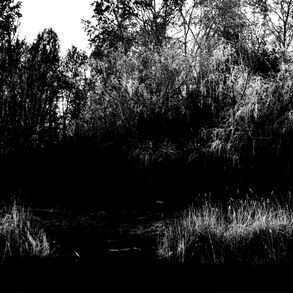|
You dart into the twilight, your wife’s voice, her pleas, trailing behind you. The screen door slaps shut, an abrupt end to a suffocating conversation. Through the mesh of the door, you hear the words, “Stay. Let’s talk it out.” But you don’t stay. You don’t talk it out. Instead, you run. Like always. You hit the street, shifting into a jog. The asphalt, slick with fresh rainfall, shimmers like onyx under the streetlights. On any other night, you’d be captured by this iridescence. But tonight, your eyes don’t linger on your footsteps. No. They’re set ahead. On escape from the trappings of modernity: the passive-aggressive nature of your relationship, the mundanity of your chair-bound 9-to-5. Running frees you. It reduces you to a single purpose: forward. And while in motion, you can focus on just that. Everything else falls away. Momentarily, at least. Head level, spine straight, you pump your arms close to your chest, allowing your hands to wobble limp at the wrists. Your forefeet slap the pavement, the soft steps swishing like a distant cicada song. Your wife’s voice chases you through the cookie-cutter lanes of your suburban neighborhood, reverberating between the single-story bungalows, each one unimaginative and uniform in its architecture. Drizzles start. They pitter-patter, pitter-patter, drowning out the noise and coalescing with the sweat beads forming on your skin, blurring the boundary between yourself and the universe. You near the end of the cul-de-sac. Ahead, thunderheads brood above the winter-stripped forest. You bound over the curb and head for the overgrown trailhead near the tree line. The bare branches of the forest reach out as if reclaiming the manicured lawn reminding you that civilization is a collective dream—the wild waits on society’s peripheries, ready to reclaim its dominion. A sharp crack, paired with a bulbous white flash, emanates from on high. A streak of translucent lightning slithers from the clouds. It doesn’t make sense, this psychedelic shimmer, but the atmospheric trick doesn’t stop you. You push forward towards the trail. The grass shifts to dirt. Scattered pebbles jab the bottoms of your feet. But you don’t wince. You grit your teeth and smile. The forest wraps you in its embrace. Illuminated by the glow of your headlamp, the trail snakes through the brush, the long grass high as your head. Branches scrape your elbows, shins, and knees. There’s pain, but the repetition of your movements dulls the sensation. A biochemical urge, part of an ancient natural reward system, drives you forward. You imagine yourself as a predator chasing prey. This is how we used to live, you tell yourself. Our ancestors descended from the trees so our legs could carry us. Then we exchanged our freedom for creature comforts. For huts, houses, and offices. The trail zigs and zags, skirting past overlooks that abut a polluted river. You hop over logs and roots, causing dead leaves to whirl in your wake. Every so often, you catch ember eyes in the reflective glow of your headlamp, but you never catch sight of the forest creature the eyes belong to. You forge ahead, your body a blade carving through the universe. Your mind is absent of any thought besides the task. In your ecstasy, you forget that the creature comforts—the huts, the houses, the offices—were erected as forms of protection, as boundaries between ourselves and the wild. You forget that out in nature, humans aren’t just predators. They’re also prey. The trail ends at a beach sheltered by a weeping willow. Your steps form depressions in the sand as your calves tighten in response to the uneven terrain. Whispers burble from the river ahead, lulling you like a sweet enchantment. “Just a little further.” You stop at the banks of the river, lacing your fingers behind your head and stretching backward. But it’s no use. Cramps skewer you between the ribs. Your lungs sear with each breath. Nail aches plague your feet, shins, and knees, their sharp pinpricks striking irregularly as if scraping bone. You slip your shoes off and dig your toes into the sand, pushing against the pain. You step into the river, the water a cold salve that laps at your feet. In the cold calm, you collect your thoughts. By the time you get home, they’ll be asleep, you think. The argument will be forgotten. Tomorrow will be another day. This is why you run: for the clarity you gain through exertion. You turn to leave but are stopped by a cerebral shudder, an alarm in your reptilian brain that indicates you’re being watched. You feel it, the devouring gaze of unseen eyes. Your headlight illuminates a thick layer of fog above the water’s surface. You can’t see the other side of the river, but you hear something splash beyond the swirling veil. Suddenly, a guttural screech fills the soundscape, the sonic assault drilling into your skull and causing you to double over. You wobble in the water as a cataclysmic rift splits your consciousness, opening you to a different plane of reality, one blooming with malevolence. A predator lies in wait. It seeps into this. You dry heave into the water, choking on the scent of sulfur. Through hot, teary eyes, you see something break the water’s surface. Whatever it is, its black-scaled body moves as if unencumbered by vertebrae. The sound drones on, paralyzing you in place. You recognize something familiar in the discordant thrum. The call of the predator. As your mind falls down the well of primordial memory, you grow blind to the present plane. Starbursts assault your eyes. White noise bathes your senses. Amidst the humdrum, you don’t notice the crocodilian-like snout inching closer, nor the stalk, snail-like eyes peeking above the water’s surface. No, you don’t notice them at all. All you notice is a sudden cacophonous silence and then the sound of the ambush.  G.D. Watry is a writer from California. His fiction and poetry have been published in Like The Wind Magazine, Pantheon Magazine, OCCULUM, and Hinnom Magazine, among other publications. You can follow him on Twitter and on Instagram. Comments are closed.
|
Archives
June 2024
Categories
All
|

 RSS Feed
RSS Feed